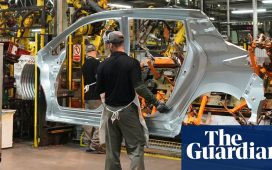Data from the Society of Motor Manufacturers and Traders (SMMT) shows that 368,617 plug-in cars were registered in Britain last year while just 6,949 standard chargers were installed. Asif Ghafoor, CEO of charging network Be.EV, said the UK’s rollout of electric vehicle charging stations is too slow and needs to be addressed.
Speaking to Express.co.uk, he said: “The Government dream of 300,000 electric car charging points by the end of 2030 has been plucked from the air but we do need more chargers.
“The UK power grid cannot support electrification at that level.
“Landowners including a lot of local councils are sitting on their land and refusing to give it to charging with a view that waiting is better than acting.
“Even once a charger company gets access to land, they face tedious application processes for power access that are mired in bureaucracy.
READ MORE: Maximum driving age proposals slammed as ‘blatant discrimination’
These challenges, he said, are leading to “land grabs” for suitable sites by companies with no immediate intention to break ground.
He added: “For example, many local authorities are delivering slow charging cluttering our highway with not-for-purpose charging for now or the future.
“Planners and Government insist on chargers at homes, most of which will be redundant technology and never used blocking power supply to the network.
“We should instead be building multiple fast, rapid and ultra-rapid charger hubs where people can fit charging their EV into their lifestyle – while they’re at work, doing their groceries, dining out, or going to the cinema.
READ MORE: Drivers should use little-known button and gears to save money
“Thousands of cheap and cheerful home wall-mounted, and lamp-post chargers, are useless if they take more than 12 hours to charge, or are broken.”
In 2022, the Government unveiled plans to deliver 300,000 electric vehicle chargers by 2030, backed by a £1.6billion investment.
This was launched as part of the Electric Vehicle Infrastructure Strategy, with the aim of increasing confidence in the public network, thus getting more drivers to switch.
The investment included £500million for public chargepoints in communities across the UK, in addition to the £450million Local Electric Vehicle Infrastructure (LEVI) fund.
Asif Ghafoor concluded, saying: “What’s more, EV drivers lack education on how to charge.
“They don’t understand how an EV battery works, they should keep their battery above 20 percent and only charge to 80 percent and not sit on chargers as we saw with Tesla at Christmas.
“If the Government is truly committed to mass electrification they should invest in our national grid infrastructure, prioritise reliable, convenient charging hubs for communities, and educate EV drivers in best practice and etiquette.”
Recent data from the AA EV Recharge Report revealed that the cost of flat rate charging on the public network fell by up to eight percent compared to December.
At the same time, fast and rapid flat rates fell by three percent compared to December.
In comparison, during the same period of time, petrol pump prices dropped by 1.7 percent.











